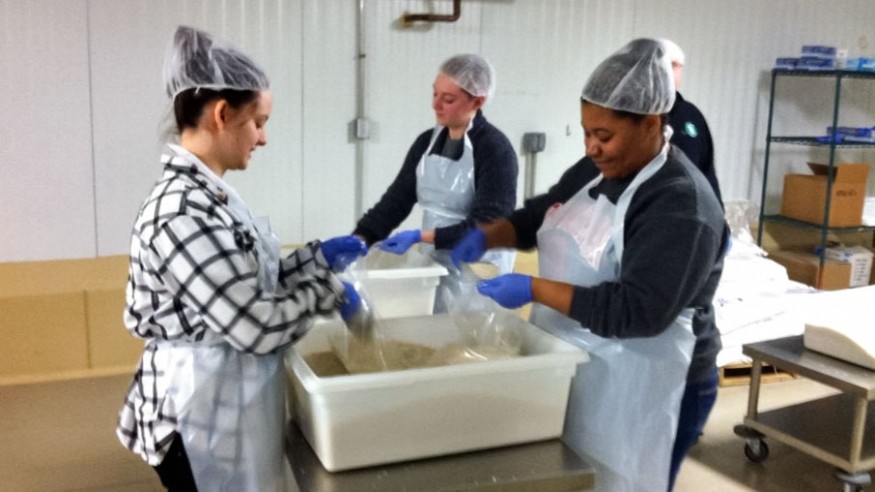
‘So Much Knowledge and a Sense of Responsibility’
Helping out at the Greater Chicago Food Depository. (Photo courtesy of OWU’s Office of University Chaplain)
Before we leave for Chicago to study the diverse ethnic, class, and gender identities among the Lesbian, Gay, Bisexual, Transgender, and Queer (LGBTQ) community, Ohio Wesleyan University Chaplain Jon Powers has some final words.
We will represent renewal in “the bowels of Chicago” as he puts it. A lot of people would think that means we’d be renewing and saving the disadvantaged and marginalized among the LGBTQ community.
They couldn’t be more wrong, though. We weren’t there to “save” anyone – the mission program’s focus is on moving away from that mindset. Even if we had wanted to, we didn’t have the time or resources to do so. I learned that in the most bitter way the second night.
I was nearly done passing out sandwiches to low-income and precariously housed residents when we were approached by a man just two days out of prison, after finishing a 15-year sentence. He had gotten cleaned up, he said, and wanted to reconnect with an elderly relative in another state. But without a fixed address or job, he couldn’t get the $12.50 needed for a one-way bus ticket.
That was all he needed for second chance, but I was bound by the rules of our partner organization and couldn’t give out money, no matter how heartbreaking the story.
When he came to us, the main thing he wanted was our prayers, and we did pray with him, but couldn’t do any more. When he left, I knew we would never see or hear from him again. That’s the case with most of the people we met in Chicago.
Like I said, we weren’t there to save anyone; in the overall scheme of things the hour or two we spent with everyone probably didn’t have much impact. We moved around all week, talking to and serving with as many organizations as possible – our main focus was learning and educating ourselves.
I could fill a hundred pages with the lessons we learned and experiences we heard and still not cover everything – we met with organizations such as Affinity Community Services and Invisible2Invicible, which address ethnic issues within the LGBTQ community; the Night Ministry, which provides free health care, food and HIV testing in low-income neighborhoods; and a pro-LGBTQ church among others.
One of the strongest experiences I had was meeting with LGBTQ senior citizens and hearing their stories. They had gone through job discrimination and violent police raids; seen Harvey Milk make history as the first openly gay elected official only to be assassinated in his own office. And then came the AIDS crisis.
One of our advisors compared that experience to seeing half our friends at OWU die, with no response from the government or society. It’s something I can’t imagine – having just one death in my family during the trip was hard enough.
Even now, the seniors are still fighting, both for themselves and the generations to follow. Several have just now been able to get married, but, as one pointed out, everything they’ve gained could be taken away if they become complacent.
Another critical lesson of the trip, though, was seeing how AIDS and HIV remain a scourge for overlooked groups on the LGBTQ spectrum, such as poor people of color and transgendered people who can’t afford protection or treatment and continue to die.
I could go on and on, but in closing what I got from this trip was so much knowledge and a sense of responsibility to support those I have learned from and those like them, whether at OWU or the greater world outside of campus. I also met similar groups from other colleges, and learned to better understand the advantages and differences of Ohio Wesleyan’s education.
It is true: We did represent renewal in the bowels of Chicago, as Chaplain Powers said we would. It was our passion for social justice that was renewed.
